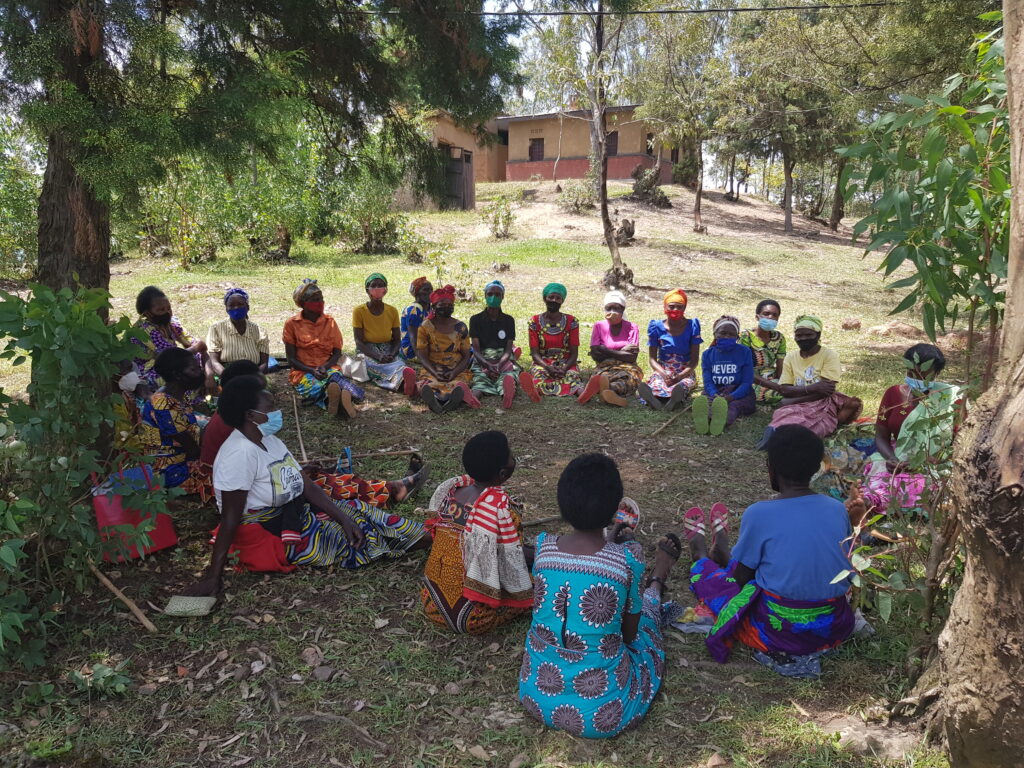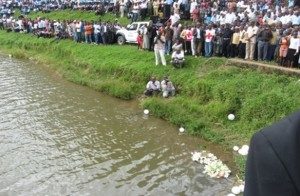
Continuing our series of articles from our Annual Report 2021/22, we outline here our work on our Empowering Vulnerable Genocide Widows in Karongi and Rutsiro Districts to Alleviate Extreme Poverty (EVKREP) Project.
In 2021, Survivors Fund (SURF), in partnership with AVEGA Agahozo, was awarded a grant of $93,604 for an 18-month project from the Addax & Oryx Foundation.
The Empowering Vulnerable Genocide Widows in Karongi and Rutsiro Districts to Alleviate Extreme Poverty (EVKREP) project will empower 400 vulnerable genocide widows and 1,200 of their dependents in Karongi and Rutsiro District of Rwanda’s Western Province to:
- Alleviate their poverty by ensuring they have the skills, resources and confidence to generate income. This will be achieved by forming and training Income Generating Activities (IGA) groups to start saving, develop viable businesses, and access capital to set up and scale businesses.
- Reduce vulnerability, build the confidence and improve the wellbeing by empowering participants to take greater control of their lives and to participate more fully in the project activities through counselling support.
- Improve food security and sustainable energy for the most vulnerable, in particular those who are elderly and affected by HIV, through provision and training in subsistence gardens, solar lamps and clean cookstoves.
Through previous joint projects, and our 2019-20 Empowering Vulnerable Genocide Widows in Karongi District to Alleviate Extreme Poverty Project (EVKEP) funded by the Addax & Oryx Foundation, we have proven that IGA group training, new business development, incentivising savings and providing access to loans, together sustainably generates income even for vulnerable genocide widows. Provision of subsistence gardens, and training to maintain them, cultivates nutritious food which alleviates hunger and malnutrition. Clean cookstoves and solar lamps provide access to a more affordable, healthy and sustainable energy source. Counselling groups foster increased resilience and confidence in a better future. When these components are integrated, as we propose to roll-out again through EVKREP – to engage widows in Karongi which we were not able to reach through EVKEP, as well as widows in the neighbouring district of Rutsiro – we prove that this can be transformative.
SURF and AVEGA have developed an IGA model using business students as Cooperative Business Development Assistants (CBDs) to train and support the widows – helping them to develop and strengthen their business plans, access capital (through funding made available through our microfinance bank partner, Urwego Bank Ltd (UBL)) and launch their ventures to be sustainable and profitable. This network of CBDs will be supported through a community-based model of 13 teams of two volunteers working across the 26 sectors of Karongi and Rutsiro (with each team covering two sectors) which will deliver supplementary support to widows:
1. Community volunteers will undertake home visits to widows, recording and reporting on their status, and providing assistance in particular in how to exploit subsistence gardening for small income and good nutrition.
2. Volunteer Counsellors trained in basic counselling techniques who support AVEGA’s professional counsellor to support the mental health of widows, which has proven to be critical in securing the effective participation of widows in IGAs.
The evidence-based approach to alleviate poverty and strengthen resilience serves as the core of this project. The volunteer network of stronger widows is a cost-effective model of outreach to deliver peer support and training to empower participants to develop a livelihood, improve their mental health and address their immediate basic needs (to ensure their food and energy security).
The project formally kicked off in July 2021, with a comprehensive survey mapping all widows, and their dependents, across the two districts, the training of the volunteer team which will be leading the outreach to project participants. By December 2021 we had reached 516 new beneficiaries who are members of income generating groups, and among them 58 have received loans from Urwego Bank. 1,204 dependents have been identified who are projected to benefit from the support from the principal beneficiaries (as a result of being members of their households). 79 beneficiaries have received counselling support, either through individual one-to-one counselling, or through counselling groups, to enable them to address their trauma and its symptoms. So far, we are working in eight new sectors in Karongi and Rutsiro, but with proper follow up in the sectors reached through the EVKEP project.
Pauline *
Pauline is one of the EVKREP beneficiaries who has benefited from joining the project. She has started her small income generating business using a loan from Urwego Bank. She is 60 years old, and survived the genocide with two children. Her husband was killed during the genocide. Pauline attended entrepreneurship training and was part of a savings group where she started saving in order to be able to apply for a loan from Urwego Bank. After training, she took a loan of Rwf 200,000 (c. $190) to start her boutique selling different kinds of beer. She has a big enough house that she can use some of the space for her store, and in so doing reduce the costs that otherwise she would be incurring in renting a space.
“I am very happy today. This time I have something to say after a long time of attending training and now I can see the fruits of it. I joined the entrepreneurship group and after the training I decided to take a loan from the bank. I chose a boutique business because in this neighbourhood many people walk a long way to buy different items including rice, potatoes, beer and so much more. Because we learnt about business opportunities, I decided to set up this boutique to sell beer. On average I can earn Rwf 90,000 (c. $85) per month. This is enabling me to meet my family needs.”

